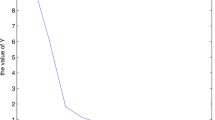Abstract
We consider a semismooth reformulation of the KKT system arising from the semi-infinite programming (SIP) problem. Based upon this reformulation, we present a new smoothing Newton-type method for the solution of SIP problem. The main properties of this method are: (a) it is globally convergent at least to a stationary point of the SIP problem, (b) it is locally superlinearly convergent under a certain regularity condition, (c) the feasibility is ensured via the aggregated constraint, and (d) it has to solve just one linear system of equations at each iteration. Preliminary numerical results are reported.
Similar content being viewed by others
References
Clarke F.H.: Optimization and Nonsmooth Analysis. Wiley, New York (1983)
Coope I.D., Watson G.A.: A projected Lagrangian algorithm for semi-infinite programming. Math. Prog. 32, 337–356 (1985)
Facchinei F., Soares J.: A new merit function for nonlinear complementarity problems and a related algorithm. SIAM J. Optim. 7, 225–247 (1997)
Fang S.C., Wu S.Y.: An inexact approach to solving linear semi-infinite programming problems. Optimization 28, 291–299 (1994)
Goberna M.A., López M.A.: Optimal value function in semi-infinite programming. J. Optim. Theory Appl. 59, 261–279 (1988)
Goberna M.A., López M.A.: Semi-Infinite Programming: Recent Advances. Kluwer, Dordrecht (2001)
Gustafson S.A.: On numerical analysis in semi-infinite programming. In: Hettich, R. (eds) Semi-Infinite Programming, Lecture Notes in Control and Information Science, vol 15, pp. 51–65. Springer, New York (1979)
Gustafson S.A.: A three-phase algorithm for semi-infinite programming. In: Fiacco, A.V., Kortanek, K.O. (eds) Semi-Infinite Programming and Applications, pp. 138–157. Springer, Berlin (1983)
Hettich R., Kortanek K.O.: Semi-infinite programming: theory, methods, and applications. SIAM Review 35, 380–429 (1993)
Hettich R., Zencke P.: Numerische Methoden der Approximation und Semi-infinite Optimierung. Teubner, Stuttgart (1982)
Ito S., Lin Y., Teo K.L.: A dual parametrization method for convex semi-infinite programming. Ann. Oper. Res. 98, 189–214 (2000)
Kanzow C., Qi H.D.: A QP-free constrained Newton-type method for variational inequality problems. Math. Prog. 85, 81–106 (1999)
Lai H.C., Wu S.Y.: On linear semi-infinite programming problems: an algorithm. Numer. Funct. Anal. Optim. 13, 287–304 (1992)
Li D.H., Qi L., Tam J., Wu S.Y.: A smoothing Newton method for semi-infinite programming. J. Global Optim. 30, 169–194 (2004)
Lin C.J., Fang S.C., Wu S.Y.: A dual affine scaling based algorithm for solving linear semi-infinite programming problems. In: Du, D.Z., Sun, J. (eds) Advances in Optimization and Approximation, pp. 217–233. Kluwer, London (1994)
Mifflin R.: Semismooth and semiconvex functions in constrained optimization. SIAM J. Control Optim. 15, 957–972 (1977)
Moré J.J., Sorensen D.C.: Computing a trust region step. SIAM J. Sci. Stat. Comput. 4, 553–572 (1983)
Ni Q., Ling C., Qi L., Teo K.L.: A truncated projected Newton-type algorithm for large scale semi-infinite programming. SIAM J. Optim. 16, 1137–1154 (2006)
Pang J.S., Qi L.: Nonsmooth equations: motivation and algorithms. SIAM J. Optim. 3, 443–465 (1993)
Polak E., Tits A.L.: A recursive quadratic programming algorithm for semi-infinite programming problems. Appl. Math. Optim. 8, 325–349 (1982)
Qi L.: Convergence analysis of some algorithms for solving nonsmooth equations. Math. Oper. Res. 18, 227–244 (1993)
Qi L., Ling C., Tong X.J., Zhou G.: A smoothing projected Newton-type algorithm for semi-infinite programming. Comput. Optim. Appl. 42, 1–30 (2009)
Qi L., A. Shapiro, Ling C.: Differentiability and semismoothness properties of integral functions and their applications. Math. Prog. 102, 223–248 (2005)
Qi L., Sun D., Zhou G.: A new look at smoothing Newton methods for nonlinear complementarity problems and box constrained variational inequalities. Math. Prog. 87, 1–35 (2000)
Qi L., Sun J.: A nonsmooth version of Newton’s method. Math. Prog. 58, 353–367 (1993)
Qi L., Wu S.Y., Zhou G.: Semismooth Newton methods for solving semi-infinite programming problems. J. Global Optim. 27, 215–232 (2003)
Roleff K.: A stable multiple exchange algorithm for linear SIP. In: Hettich, R. (eds) Semi-Infinite Programming, Lecture Notes in Control and Information Science, vol 15, pp. 83–96. Springer, New York (1979)
Rückmann J.J., Shapiro A.: Second order optimality conditions in generalized semi-infinite programming. Set-Valued Anal. 9, 169–186 (2001)
Shapiro A.: First and second order optimality conditions and perturbation analysis of semi-infinite programming problems. In: Reemtsen, R., Rükmann, J. (eds) Semi-Infinite Programming, pp. 103–133. Kluwer, Boston (1998)
Stein O., Tezel A.: The semismooth approach for semi-infinite programming under the reduction Ansatz. J. Global Optim. 41, 245–266 (2008)
Still G.: Discretization in semi-infinite programming: the rate of convergence. Math. Prog. 91, 53–69 (2001)
Sheu R.L., Wu S.Y., Fang S.C.: A primal-dual infeasible-interior-point algorithm for linear semi-infinite programming. Comput. Math. Applic. 29, 7–18 (1995)
Tanaka Y., Fukushima M., Ibaraki T.: A globally convergent SQP method for semi-infinite nonlinear optimization. J. Comp. Appl. Math. 23, 141–153 (1988)
Teo K.L., Rehbock V., Jennings L.S.: A new computational algorithm for functional inequality constrained optimization problems. Automatica 29, 789–792 (1993)
Teo K.L., Yang X.Q., Jennings L.S.: Computational discretization algorithms for functional inequality constrained optimization. Ann. Oper. Res. 98, 215–234 (2000)
Todd M.J.: Interior-point algorithms for semi-infinite programming. Math. Prog. 65, 217–245 (1994)
Watson G.A.: A multiple exchange algorithm for multivariate Chebyshev approximation. SIAM J. Numer. Anal. 12, 46–52 (1975)
Watson G.A.: Numerical experiments with globally convergent methods for semi-infinite programming problems. In: Fiacco, A.V., Kortanek, K.O. (eds) Semi-Infinite Programming and Applications, pp. 193–205. Springer, Berlin (1983)
Wu S.Y., Li D.H., Qi L., Zhou G.: An iterative method for solving KKT system of the semi-infinite programming. Optim. Methods Softw. 20, 629–643 (2005)
Author information
Authors and Affiliations
Corresponding author
Additional information
Chen Ling work was supported by the National Natural Science Foundation of China (10871168), the Zhejiang Provincial National Science Foundation of China (Y606168) and a Hong Kong Polytechnic University Postdoctoral Fellowship. Qin Ni work was supported by the National Natural Science Foundation of China (grant 10471062). Liqun Qi work was supported by the Hong Kong Research Grant Council (Grant PolyU 102307) and a Chair Professor Fund of the Hong Kong Polytechnic University.
Rights and permissions
About this article
Cite this article
Ling, C., Ni, Q., Qi, L. et al. A new smoothing Newton-type algorithm for semi-infinite programming. J Glob Optim 47, 133–159 (2010). https://doi.org/10.1007/s10898-009-9462-7
Received:
Accepted:
Published:
Issue Date:
DOI: https://doi.org/10.1007/s10898-009-9462-7



